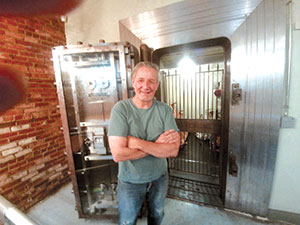
*
A poet, writer, and memoirist, who brought the famed Poets Theater from Cambridge, Mass to Somerville’s Arts Armory
*
I first met poet Richard Cambridge when we worked on the poetry anthology City of Poets: 18 Boston Voices, in 2000. About a decade ago I interviewed him on my Somerville Community Access TV show Poet to Poet/Writer to Writer, when he still had the “Poets’ Theater” at the famed Club Passim in Harvard Square. In 2010 he moved the theater to the Somerville Arts Armory, and hasn’t looked back. He continues to run this series of poets, musicians, artists, who strut their stuff on the stage. I recently caught up with Cambridge at the Bloc 11 Cafe in Union Square, Somerville.

Poet Richard Cambridge
Doug Holder: You moved from Club Passim to the Arts Armory in Somerville. How is the Armory?
Richard Cambridge: It is great. the Sater brothers, who own the Middle East Restaurant in Cambridge, bought the armory and restored it. It is a stunning space. They virtually turned it over to the community. They are incredibly generous. It is like a big, artists’ club house. They have a winter farmers’ market, classes, studio space, performances – you name it.
DH: The Club Passim has such a history with folks like Dylan and Baez playing there in the infancy of their careers. Why did you leave a place with such a cache?
RC: We had to. After the crash in 2008, a lot of Club Passim donors just dried up. The club was struggling. They needed to make more money. So they asked me to take my show elsewhere. I left in September 2010 and by October 2010 I was back in business at the Armory. I believe we had poet, saxophonist and Hanging Loose Press editor Dick Lourie as one of our first guests.
DH: You have had a number great acts at the Poets’ Theatre in Somerville.
RC: Yes. Recently we had Lo Galluccio and the Black Swans. Galluccio performs brilliantly in so many genres – poetry, memoir writing, singing, fiction, etc. She also was on stage with the Poet Laureate of Somerville, Nicole Terez Dutton, as well as poet Teisha Twomey. The talented singer/songwriter/photographer/poet Jennifer Matthews will be performing with guests soon as well. We are always looking for talent. We just don’t want someone to go up there and read poetry and nothing else.
DH: There has always been a political sensibility to your poetry. Can you talk about this?
RC: I dropped out of Northeastern University in 1970 during the student strikes. I helped the Black Panthers open up a Peoples’ Revolutionary Constitutional Convention. By the way, this is the 50th anniversary of the Panther’s founding. There will be an anniversary in party in Oakland. I will be there. Anyway, I toured around a lot of different colleges with my wife, who was a philosophy professor at North Eastern. I met Tupak Shakur’s mother, who was one of my mentors. So I have been steeped in revolutionary politics early on.
DH: You wrote a memoir about your hitchhiking experiences titled Ride. Can you give us an anecdote from the book?
RC: I had a feature in Asheville, North Carolina, and my car broke down – this was in the mid 90s. I started to hitchhike and hardly got any rides. I kept a diary-and recorded each ride. I even recorded how many cigarettes I smoked each day. All these memories triggered the book.
I sort of got brutalized by a state trooper who picked me up. He wanted to know if I was carrying any dope. I wasn’t. Then he forced me in his car and took me on this crazy joyride. He must have been going over 120 miles per hour. I was scared as hell. Then he dropped me off at an exit and told me that he didn’t want to catch me doing this again. It took me another 20 rides to get to my destination.
DH: You got your MFA at the Stone Coast Low Residency program in Maine. I understand you worked with the accomplished writer and memoirist Richard Hoffman, whom I had the pleasure to interview as well.
RC: Richard was one of my mentors there. We became really close friends. He transitioned me from a poet who has written a novel to a novelist. We would meet once a week for dinner, and then he would go over 25 pages of my manuscript. Then we would have discussions, I would do drafts, etc. Writer Michael Kimball also helped me a lot. This was one of the best experiences of my life. I never had to work so hard, so long. The teachers were like us, no stratification present. Richard and I were both born in 1949, and experienced a lot of the same things. He wrote a wonderful memoir, Half the House. His latest memoir is Love and Fury.
DH: You were involved in the Slam Poetry Movement jump-started by Patricia Smith and Michael Brown. Are you still involved with Slam at the Cantab Lounge in Cambridge, Mass?
RC: I don’t go there as frequently as I used to. But when I did I took to the energy it had. It showed me how to project myself theatrically. Smith, Brown, Ryk McIntyre, and others really helped me out. Right now I am writing more fiction.
DH: What are you working on now?
RC: I am working on a book titled 1970. It is not unlike Philip Roth’s Plot Against America, that took place in the 40’s. In 1970 I was right out of college. I think so many things that happened in 1970 could have gone in the other direction, and we could be hopefully living in a better world.












Reader Comments